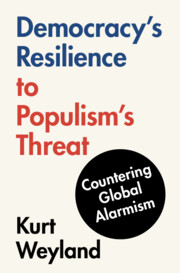
- Publisher:
- Cambridge University Press
- Online publication date:
- January 2024
- Print publication year:
- 2024
- Online ISBN:
- 9781009432504
- Subjects:
- Political Sociology, Politics and International Relations, Comparative Politics, Sociology


The recent global wave of populist governments, which culminated in Donald Trump's victory in 2016, has convinced many observers that populism is a grave threat to democracy. In his new book, Kurt Weyland critiques recent scholarship for focusing too closely on cases where populist leaders have crushed democracy, and instead turns to the many cases where would populist-authoritarians have failed to overthrow democracy. Through a systematic comparative analysis of thirty populist chief executives in Latin America and Europe over the last four decades, Weyland reveals that populist leaders can only destroy democracy under special, restrictive conditions. Left-wing populists suffocate democracy only when benefitting from huge revenue windfalls, whereas right-wing populists must perform the heroic feat of resolving acute, severe crises. Because many populist chief executives do not face these propitious conditions, Weyland proves that despite populism's threat, democracy remains resilient.
‘When do populists destroy democracy? In this nuanced and incisive analysis, Kurt Weyland argues that populist governments erode democracy only under specific conditions. This is a welcome and innovative intervention to an important debate.’
Anna Grzymala-Busse - Michelle and Kevin Douglas Professor of International Studies, Stanford University
‘In this magisterial study, Weyland analyzes when and how democracies withstand the threat of populist authoritarianism. Weyland’s comprehensive analysis is a must-read for all those interested in the prospects for democracy around the world - including for students of American politics who will see recent US experiences set in global perspective.’
Frances Lee - Professor of Politics and Public Affairs, Princeton University
‘Many scholars assume that populism is a threat to democracy, but rarely do they specify how severe that threat is, or the conditions under which it is more or less likely to prove fatal to democracy. Kurt Weyland tackles that challenge in this ambitious and path-breaking book. Weyland compares populist leaders in thirty countries across Europe and Latin America to develop a theory of democratic resilience in the face of populist challenges. He demonstrates that most democratic regimes are capable of withstanding populist threats, and these threats are only likely to bring about democracy’s demise under a restrictive set of conditions. This book is essential reading for anyone concerned about democracy’s fate in the modern world and it offers critical insights for those seeking to identify the nature and sources of democratic resiliency.’
Kenneth M. Roberts - Richard J. Schwartz Professor of Government, Cornell University
 Loading metrics...
Loading metrics...
* Views captured on Cambridge Core between #date#. This data will be updated every 24 hours.
Usage data cannot currently be displayed.